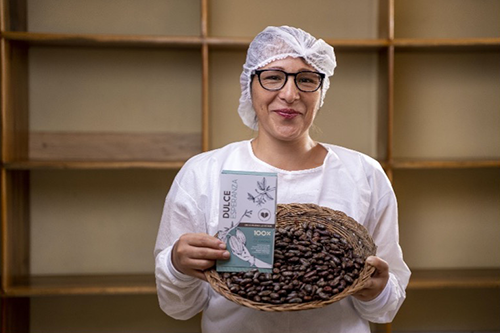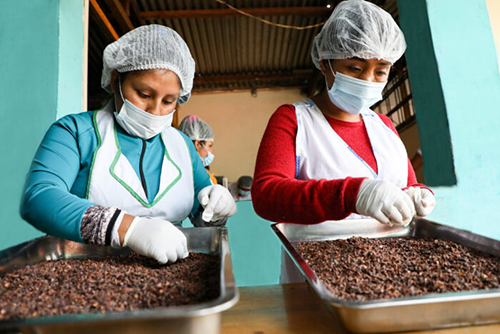
Cooperatives of incarcerated workers are becoming more common around the world because they have shown to improve the livelihoods of incarcerated workers and their families, facilitate their re-entry and significantly reduce recidivism.
In Italy, about 2,000 people or 12% of the incarcerated population working for the prison administration are organized in co-ops. Their recidivism rate is 5 percent, much less than the 70-90 percent estimated for the other prison systems.1 At least four similar incarcerated workers’ co-ops exist in Puerto Rico. Through the U.S. Agency for International Development (USAID)-funded Cooperative Development Program (CDP), the Peruvian National Penitentiary Institute (INPE), Ministry of Production and NCBA CLUSA are piloting this model with a group of women called Dulce Esperanza, who produce chocolate and are in the process of forming a co-op.
On February 15, NCBA CLUSA hosted a webinar called “Empowering Incarcerated Workers through Cooperatives” to learn from the experiences of these co-ops in Italy, Puerto Rico and the Dulce Esperanza group in Peru. If you missed our webinar, watch the recording now.
Watch in English Watch in Spanish
Jessica Gordon Nembhard, Professor of Community Justice and Social Economic Development in the Department of Africana Studies at John Jay College, City University of New York (CUNY) and member of NCBA CLUSA’s Cooperative Economics Council, moderated the webinar. Our panel included Valerio Pellirossi, expert in social cooperatives and Senior Policy Advisor at Italy’s Confcooperative Federsolidarietà; Lymarie Nieves Plaza, co-op developer in Puerto Rico and Co-founder of Impulso Cero; and Denis Calderón, NCBA CLUSA Peru’s Cooperative Law Expert.
Mark Gizzi, Director of USAID Peru’s Office of Alternative Development, who visited the Dulce Esperanza group in the Quillabamba Prison in Cusco, Peru in October 2021, provided opening remarks. Gizzi reflected on his visit with the Dulce Esperanza group: “These are women who are in prison because they have committed crimes, but they are also mothers and family members.”
With NCBA CLUSA support, the cooperative model is “giving them the opportunity to redeem themselves, vis-a-vis their families, their children and their society” and “giving them the opportunity to become useful people, proud of their work and their final product.” Gizzi added that labor inclusion initiatives for incarcerated workers like Dulce Esperanza should be replicated. “By becoming cooperatives, these groups can formalize, become better organized and equipped, increase their capacity and thereby their sales. A world of opportunities opens for them,” he said.
Gordon Nembhard introduced the audience to the incarcerated workers’ co-op model and stressed their potential to improve the lives of millions of people globally. She mentioned NCBA CLUSA’s case study on the Dulce Esperanza group called “Empowering Incarcerated Women Through Cooperatives in a Peruvian Prison,” which explains the origins of this group, its development and challenges, lessons learned and pending actions.
Read the case study in English Read the case study in Spanish
During the discussion, our panelists stressed that cooperatives help people deprived of their physical liberty in prisons—who are mostly from historically marginalized or underserved social groups—to increase their self-esteem, see themselves as human beings with a chance to right their wrongs, develop their skills and generate sustainable, demand-driven, income-generating work opportunities. Through the training and capacity development needed to form and manage a cooperative, incarcerated workers’ lives are transformed. Their outlook on life changes, they develop self-respect and trust, and their personal growth benefits their families, communities and society at large. They take pride in earning an income and supporting their families while in jail. And the stability provided by the co-op facilitates their reentry into society—especially when their cooperative membership continues after their release.
The cooperative model rehabilitates incarcerated people by providing them with opportunities to exercise their own agency, reclaim their humanity, earn a living and sustain their families.
 Still, incarcerated workers’ co-ops face many challenges. Because they are based in penitentiary institutions that must approve and support the co-op’s operations, maintaining an autonomous, democratically managed businesses can be difficult. The panelists agreed that enabling environments for incarcerated workers’ co-ops are imperative.
Still, incarcerated workers’ co-ops face many challenges. Because they are based in penitentiary institutions that must approve and support the co-op’s operations, maintaining an autonomous, democratically managed businesses can be difficult. The panelists agreed that enabling environments for incarcerated workers’ co-ops are imperative.
In every country, the situation is different, and changes in political leadership and penitentiary administration can threaten progress. Best practices regarding legislation and institutions that have allowed for significant progress in Italy and Puerto Rico were shared. Panelists emphasized that it is critical to raise awareness of incarcerated workers’ cooperatives, since prisons are still seen as an unsuitable place to start a business. It is also important to build bridges that allow for the work that incarcerated workers do inside penitentiary institutions to continue once they are outside, without the stigma of having been incarcerated.
Among the lessons learned, we highlighted that the cooperative model—anchored in solidarity among members and other stakeholders—rehabilitates incarcerated people by providing them with opportunities to exercise their own agency, reclaim their humanity, earn a living and sustain their families. This self-reformatory impact continues long after they are released, reducing recidivism and allowing them to make sustainable contributions to their families and communities.
—Carmen Rosa Chavez Hurtado is director of CDP Perú.


